May 15, 2009
Air Date: May 15, 2009
FULL SHOW
SEGMENTS
The Future of Species Protection
View the page for this story
The Obama administration's recent decisions on the gray wolf and the polar bear have enraged some environmentalists and could indicate a moderate approach to using the Endangered Species Act. Vermont Law School professor Patrick Parenteau analyzes the politics of protecting endangered species with host Jeff Young. (06:50)
Leaving Hydrogen in the Dust
View the page for this story
Energy Secretary Steven Chu reversed the Bush administration’s pro-hydrogen fuel cell vehicles agenda. Many in the hydrogen industry are appealing but as Jim Motavalli, author of Forward Drive: The Race to Build Clean Cars, tells host Steve Curwood, the surge of electric vehicles promises a quicker payoff. (05:15)
Coal Down Under
View the page for this story
A group of the influential climate scientists told the Australian coal industry that they need to get out of business. Professor David Koroly of Melbourne University is one of those scientists. He tells host Steve Curwood that Australia will be in serious trouble if they don’t move quickly against coal. (05:35)
Note on Emerging Science
/ Jessie MartinView the page for this story
New research shows that honey bees do even more to help flowers we ever knew. Jessie Martin reports on honey bee bodyguards and their implications for sustainable farming. (01:40)
Deforesting the Forbidden Fruit
View the page for this story
The ancestral species of many fruits and nuts we enjoy in the West are threatened with extinction in Central Asia. A recent report by Fauna & Flora International has found nearly 90 percent of the region's fruit and nut forests have been lost in the past 50 years. The conservation group's Global Trees Campaign coordinator, Georgina Magin, talks with host Jeff Young about what's at stake if the ancestral roots of the fruits we enjoy are lost forever. (06:00)
Rock the Boat
View the page for this story
Wisconsin is fighting the spread of aliens in their water with the power of rock and roll. Bret Shaw, an environmental communications director at the University of Wisconsin, tells host Jeff Young about a band of inspired musician-anglers helping “reel” in the spread of aquatic invasive species. (05:40)
On Their Own Terms
/ Ingrid LobetView the page for this story
A steady stream of discarded televisions and computers flows into America's landfills. Some of the electronics also end up in shops in Asia that have hazardous working conditions. But now some are heading to a worker-run women's cooperative in Mexico, a business the women started from scratch. Living on Earth’s Ingrid Lobet reports from Fronteras, Mexico. (10:45)
Potty Humor
View the page for this story
Gordon Javna, better known as Uncle John, has edited more than 75 books on many topics but all his books have one thing in common: they’re meant to be read in the bathroom. Javna talks with host Jeff Young about his latest book, “Uncle John’s Certified Organic Bathroom Reader.” It is full of short stories and information about the environmental, ‘er, movement. (05:50)
Show Credits and Funders
Show Transcript
Hosts: Steve Curwood and Jeff Young
Guests: Gordon Javna, David Koroly, Georgina Magin, Jim Motavalli, Pat Parenteau, Bret Shaw
Reporters: Ingrid Lobet
Science Note: Jessie Martin
[THEME]
CURWOOD: From Public Radio International - this is Living on Earth.
[THEME]
CURWOOD: I’m Steve Curwood.
YOUNG: And I’m Jeff Young.
The dream of hydrogen fuels to replace gasoline gets deferred.
MOTAVALLI: Jules Verne actually thought that we would have hydrogen cars and horses on the road together. We are not at that point now and we are not likely to get to that point anytime soon.
YOUNG: The US energy department slows down the hydrogen highway.
CURWOOD: Also - finding work is a struggle if you’re a middle-aged Mexican woman. But Las Chicas Bravas didn’t complain – they organized.
VALENZUELA: Everybody said the women’s cooperative would never make it. We had no money and no contacts so we would never find a building in which to put a business.
CURWOOD: Tough girls – find success doing a tough job.
YOUNG: And a new way to fight invasive species- rockabilly reminders for the rod and reel set.
These stories and more - this week on Living on Earth. Stick around!
[MUSIC: Boards Of Canada “Zoetrope” from “In A Beautiful Place Out In The Country” (Warp Records 2000)]
The Future of Species Protection
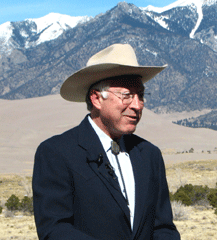
Interior Secretary Ken Salazar was raised on a cattle and sheep ranch in Colorado. (Photo: Tami Heilemann, DOI-NBC)
CURWOOD: From the Jennifer and Ted Stanley studios in Somerville, Massachusetts, this is Living on Earth. I’m Steve Curwood.
YOUNG: And I’m Jeff Young in Washington where the Obama administration's energy agenda is running into stiff resistance.
For the first time Senate Republicans got enough votes to block one of the president’s nominees-- David Hayes, Mr. Obama’s choice to become deputy secretary of the Interior Department.
CURWOOD: Republican say it’s nothing personal about Mr. Hayes, who held the same position under President Clinton. It’s really about oil and gas.
Utah Republican Senator Robert Bennett is upset because the Interior Department revoked drilling leases near two national parks in Utah. And Alaska Senator Lisa Murkowski questions if the administration is allowing enough offshore drilling.
MURKOWSKI: Are we making a commitment to increase domestic production in this country, as I believe we should, and as the president himself stated. He said, “oil and gas need to be part of the equation.” But they need to translate those words into action.
CURWOOD: Senate leaders expect Mr. Hayes will eventually be confirmed for the number two spot at interior. But other nomination battles are still brewing, including the top air quality slot at EPA and two senior officials at the energy department.
But Jeff, while Republicans are fighting on the energy front, they must have liked the Administration’s recent ruling about polar bears and wolves.
YOUNG: I imagine so - but some environmental groups do not like those decisions on endangered species.
Interior Department Secretary Ken Salazar is sticking with a Bush-era decision that limits protections for the polar bear. The bear is threatened by melting arctic ice from climate change, but secretary Salazar chose not to use the Endangered Species Act to try to try to limit greenhouse gas emissions. Environmental activists are also taking Secretary Salazar to court for sticking with the Bush plan to remove the gray wolf in the Northern Rockies from the endangered species list.
I spoke to Vermont Law School professor Pat Parenteau who is an expert on the act.
PARENTEAU: I think Secretary Salazar represents a new kind of western voice. For example, oil and gas leasing on public lands – he’s been very critical of that program. But when it comes to endangered species and particularly the management of these large predators like the wolf – I think what we’re seeing is a very old style western politician at work – someone who can’t divorce himself really from the community he grew up in, ranching community. And who is very sympathetic with people in the west who have made their living on the land and for right or wrong who see the intrusion of the federal government into the way the way they manage their lands as something that they want to minimize. So, Salazar is straddling a bit on some of these western issues, and it will be interesting to see how he manages these very conflicted policies that he has to be responsible for within the Department of Interior.

The gray wolf-- no longer an endangered species in the northern Rockies. (Courtesy of the U.S. Fish and Wildlife Service)
PARENTEAU: I think he did. There were other options open to the secretary. He could have crafted a different kind of rule that didn’t rule out the possibility of considering the effects of greenhouse gas emissions on the polar bears, but the Obama administration prefers a comprehensive bill that’s pending in the Congress right now to deal with climate change and really does not want to use the Endangered Species Act to address that major problem. But the Endangered Species Act is designed to address all threats to species and particularly cumulative threats. If you think of the example of water withdrawals and affecting salmon in the pacific northwest, no single water withdrawal threatens the survival of the salmon, but we know now that the combination of all the water withdrawals plus of course pollution and other things, are in fact driving the salmon to extinction. The polar bear is a very similar situation. No one power plant is confusing the Arctic to melt. The combination of all power plants though, most assuredly are causing the Arctic to melt. The only answer to that question is to limit the amount of carbon dioxide coming from power plants and the Endangered Species Act – although it’s no the ideal tool – to address that problem by any means, it is certainly a tool.
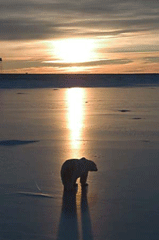
Some fear by the time Congress acts on climate change, polar bear populations will have passed the tipping point for their survival. (Photo: Lee Foster)
PARENTEAU: Yes, I think it does set a precedent. They next species in line to be listed as a result of climate change is a species called the pika, which is a small mammal, a rodent like species that lives in very high elevation areas of the west, the Rocky Mountains, for example. And we’re gonna have this – face the same problem there. The science clearly suggests that the species should be listed. Fish and Wildlife Service seems to be moving in that direction, and you’ll have a repeat, I think, of what we saw with the polar bear, which is they’ll list the species and then will immediately issue this rule – it’s called a 4D rule, like they did for the polar bear. And it will say, for example, we are not going to take into account greenhouse gas emissions when we look at threats to the pika.
YOUNG: Now this seems to be kind of an inconsistent argument, that here’s the threat: climate change. And here’s the plan for dealing with it: we’re gonna ignore climate change. If this goes to court, as it most surely will, well –you’re a lawyer – what are the department’s chances of winning there?
PARENTEAU: Well there are cases pending now in federal court in the District of Columbia, and I think the courts may very well over turn this rule and send it back to Secretary Salazar. And it may provide the secretary with a second opportunity to take a look at this situation. But yeah, I think there are strong legal arguments to challenge the explanation that the agency has offered for why the most prominent threat to the polar bear is being excluded from consideration in this special rule that they’ve adopted.
YOUNG: Professor Pat Parenteau specializes in endangered species and climate change issues at Vermont’s Law School. Thanks very much for your time.
PARENTEAU: My pleasure. Thank you, Jeff.
Related links:
- Check out LOE's profile of Secretary Salazar.
- Learn more about Patrick Parenteau.
- Click here for more on the Interior Department’s polar bear decision….
- … and the Department’s delisting of the gray wolf.
- For more on the environmental group Defenders of Wildlife, click here.
Leaving Hydrogen in the Dust

Jim Motavalli about to test drive the Nissan EV. (Photo: Remy Chevalier)
CURWOOD: The Bush Administration made a big commitment to the development of hydrogen fuel cell cars, but the Obama Administration has now proposed slashing that budget by nearly 60 percent.
With us now is journalist Jim Motavalli. He wrote ”Forward Drive: the Race to Build Clean Cars” - he also blogs for the New York Times. I asked him what’s knocked hydrogen cars out of favor.
MOTAVALLI: Well, electric car recharging networks are really getting started. There’s a bunch of companies entering that arena and signing agreements with cities, towns, states, even whole countries to wire them up for electric cars. The infrastructure is king. Once you have recharging stations, you can have electric cars. I think we’re actually seeing that revolution happen. The hydrogen revolution, the joke is its always twenty years away, and unfortunately it still is. The fuel cell was actually invented around 1850. And there’s always been the potential of fueling automobiles with hydrogen. Jules Verne – he actually thought that we would have hydrogen cars and horses on the road together.
[LAUGHING]
MOTAVALLI: So, we’ve always known that hydrogen had, you know, a lot of energy potential. But making it practical for a vehicle has been a daunting task.
CURWOOD: We’ve talked to some people at the National Hydrogen Association and the California Hydrogen Business Association – seems like they didn’t see this coming.
MOTAVALLI: I don’t think anybody saw this coming. It was really a surprise to a lot of people, the National Hydrogen Association, the U.S. Fuel Cell Council. They issued a joint statement. I think they were pretty shocked by it, because they had just asked for something like 1.2 billion in the stimulus money. And Secretary Chu had just funded something like 43, 44 million dollars in hydrogen projects. So it looked like he was on the team. And then, abruptly, he was not.
CURWOOD: How are they hydrogen developers taking this news?
MOTAVALLI: I think they’re really angry about it. They are trying to lash out and there was just a very high profile resignation from the Department of Energy’s hydrogen advisor committee, Jay Byron McCormick, who’s the former executive director of General Motor’s fuel cell program just sent Energy Secretary Steven Chu an email critical of the agency’s decision. He said he couldn’t in could conscience remain on the committee. And I think the hydrogen advocates think if they can get together in a room with Chu they might be able to persuade him to change his mind.
CURWOOD: Now the hydrogen advocates, the National Hydrogen Association and those folks says that Secretary Steven Chu is, well, he’s misinformed about fuel cell technology, that in fact, its well advanced and that it would not be wise for the U.S. to jump out of the race at this point. What are some of the accomplishments that are already on hydrogen’s mantle place?
MOTAVALLI: Well, I think they’ve gotten the California Fuel Cell Partnership up and running, and they’ve made a whole lot of advancements. John Hanson of Toyota told me, and I think this is true, that hydrogen has made more advances over the last four or five years than battery cars have. They cars themselves have gotten very sophisticated, really, really fun to drive, and they use space really well. They’ve made the fuel cell very compact so you have lots of storage space and the cars are probably better to drive than battery cars right now.
CURWOOD: Jim, just for folks who might be confused here – what’s the difference between a battery car and a hydrogen car. They’re both electric vehicles.
MOTAVALLI: Yes, they are indeed both electric, and the hydrogen car uses an electric motor to get around. So they’re both electric, but the hydrogen car uses a fuel cell to convert hydrogen into electricity using a chemical process. So, instead of the battery you’ve got the fuel cell. And it has the possibility of more range, because battery cars are still somewhat challenged as to range.

Jim Motavalli with the Nissan EV. (Photo: Remy Chevalier)
MOTAVALLI: Yes, they have built some hydrogen stations in California, but I think they ran into the budget realities. California has huge budget shortfalls and I think Schwarzenegger probably has other priorities right now rather than building the hydrogen highway. They have appropriated some money recently to build a few more stations, but its not the whole highway and I don’t think we’re gonna see that.
CURWOOD: Now, well, we’re getting out of the hydrogen business. There are other places that are moving forward with it. I mean, Norway is still moving on down that hydrogen highway. What is the risk to America about getting left in the dust on this technology?
MOTAVALLI: Hydrogen advocates are making the case that we should move forward in all fronts. They’re not really bad-mouthing electric cars. They say we need to be ready for any form of technology that could possibly come to the front. I think there’s a point to be made with that, but the government does have to set priorities. And I would say that right now electric cars have come to the forefront and that has pushed hydrogen back a little bit.
CURWOOD: Jim Motavalli writes for many blogs including the New York Times, and is author of the book “Forward Drive: The race to build clean cars.” Thanks so much, Jim.
MOTAVALLI: Great to be on.
[MUSIC: Hydrogen: Ce’u “Canagote” from Canagote EP (Six Degrees Records 2009)]
Coal Down Under

An open pit coal mine, Goonyella, Queensland, Australia.
YOUNG: Just ahead, finding the right hook for anglers-- with country music. Keep listening to Living on Earth.
YOUNG: It’s Living on Earth, I’m Jeff Young.
CURWOOD: And I’m Steve Curwood.
Some of Australia’s most prominent climate scientists have written a letter to the country’s coal industry with a simple message: get out of the coal business.
Professor David Karoly of Melbourne University helped write the open letter and he’s on the line.
Professor Karoly, now, I’m looking at your letter—you and your colleagues say coal fired power stations are doomed. Not only that – you say that government investment in carbon capture and storage will likely waste time and money.
KAROLY: That’s part of the story. I mean what we’re really saying is that Australia cannot meet its obligations in terms of reducing greenhouse gas emissions and avoiding or minimizing dangerous climate change under the U.N. Framework Convention on Climate Change by continuing with coal fired power stations. So what we were really trying to do is, first of all, alter the owners of the coal-fired power stations to their responsibility in terms of greenhouse gas emissions for adverse impacts in many different areas around the world. Secondly, we wanted to alert them to the urgency needed in terms of reducing greenhouse gas emissions.
CURWOOD: When the Rudd government just before the Bali meeting of the Kyoto negotiations, that was in December of 2007, there was quite a flourish that – yes, Australia is going to take part now in the Kyoto Protocol, it had been a holdout along with United States and that things had changed in terms of the Australian government’s approach to climate change. What has the government said to you in response to this letter?
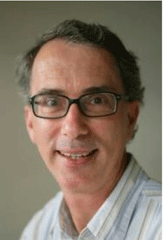
David Koroly
CURWOOD: Professor, what’s been the public response to your letter?
KAROLY: We’ve had a very positive response from a number of groups, although there have also been a few people that have described our letter and the need for 90 percent emission reductions in Australia by 2050 as we’re living in fairy land.
CURWOOD: In terms of your letter, you point out that more than 80 percent of Australia’s electricity comes from coal fired power plants. So, getting to the kind of reductions that you’re talking about here is really going to turn the whole electricity industry upside down in your country.
KAROLY: That is exactly the reason that we wrote the letter and sent the letter because it is impossible to meet Australia’s emission reduction targets without turning the energy production system in Australia completely upside down. And that needs to happen urgently. There are existing technologies available within Australia including solar power, wind power, geothermal power and wave power. However they are being under resourced because of the ongoing pressure from the coal industry in Australia to continue to use coal as the major source of fuel.
CURWOOD: What are the odds of Australia renegotiating its energy trajectory and responding to what you want?
KAROLY: Well I think that’s already happening in the sense that Australia is already introducing legislation. And on the fourth of May the Australian federal government revised the targets for its carbon pollution reduction scheme increasing the reduction levels from a previous fifteen percent maximum reduction in 2020 to now a twenty five percent emission reduction by 2020 relative to 1990 levels.
CURWOOD: Had nothing to do with your letter?
KAROLY: Well, we’ve had no communication from the federal government, so I would have to assume that its purely coincidence, but I don’t really know. Of course it needs to be born in mind that Australia has about the highest per capita emissions of greenhouse gases in the world, and therefore in any sort of contract and converge approach or equitable allocation of emissions reductions per capita around the world, Australian emission reductions needs to be higher in a percentage way than almost any country except perhaps the United States and Canada.

An open pit coal mine, Goonyella, Queensland, Australia.
KAROLY: No, no, we are not doomed. We are committed to significant climate change. But the sooner we act, the less will be that climate change and the quicker we’ll be able to stabilize the climate system. The longer we wait the worse will be the climate change that we will be impacting on ourselves and our children.
CURWOOD: And our children’s children.
KAROLY: Exactly.
CURWOOD: David Karoly is a professor at the University of Melbourne and one of the lead authors of the IPCC, the Intergovernmental Panel on Climate Change, Fourth Assessment Report and also an author of a letter to the Australian coal industry telling them that its time to get out of the coal fire power plant business. Thank you so much, sir.
KAROLY: Thank you.
Related link:
Read the open letter to the coal industry.
Note on Emerging Science
CURWOOD: Just ahead – the vanishing biodiversity of the apple – but first this note on emerging science from Jessie Martin.
[BEE BUZZING]
MARTIN: There’s no such thing as a free lunch - even honeybees have to earn their keep as they flit from one meal to the next. Flowers provide them with nectar, and in exchange, the bees spread pollen from one plant to another.
Now, new research shows that honeybees do even more to earn their lunch than previously thought.
[SCIENCE NOTE THEME]
According to scientists from the University of Wurzburg, honeybees act as plant bodyguards by scaring away caterpillars that would otherwise munch on the plants’ leaves.
Honeybees aren’t actually dangerous to caterpillars, but wasps are. And the caterpillars – using fine hairs on their bodies to detect flying insects - can’t tell the difference - so they keep away from areas with large honeybee populations. In fact, in lab experiments, the scientists found that when honeybees are around, caterpillars do 60 to 70 percent less damage to plant leaves.
The researchers hope their discovery will soon be applied to sustainable farming practices. If crops and flowers are grown side by side in the same field, then honeybees attracted to the flowers will become crop protectors – allowing farmers to use fewer chemical pesticides.
And that’s an idea that’s worth some buzz.
[BEE BUZZING]
MARTIN: That’s this week’s note on emerging science. I’m Jessie Martin.
Deforesting the Forbidden Fruit

A bowl of Central Asian fruits and nuts. (Photo: Chris Loades, FFI)
YOUNG: There’s nothing more American than apple pie.
But, like a lot of Americans, apples have their roots in another country—for the apple the old homeland is present day Kazakhstan. The apple is just one of many important fruits and nuts that descend from ancestral versions still found in the mountain forests of Central Asia. But a recent report by the conservation group Fauna and Flora International shows most of Central Asia's fruit and nut forests are already gone. More than 300 species are threatened with extinction.
Georgina Magin coordinates the group’s Global Trees Campaign. Ms Magin, welcome to Living on Earth.
MAGIN: Thank you very much.
YOUNG: Now I have to confess: this is a part of the world where I am profoundly ignorant, but we’re talking largely about the “stans” here, aren’t we?
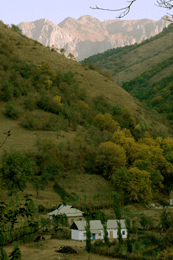
(Photo: Chris Loades, FFI)
YOUNG: Now I don’t have a lot of knowledge of this area, but it turns out I probably should be very grateful for some of the very early exports from that area, right?
MAGIN: That’s right. It’s believed that many of the domesticated varieties of fruits and nuts such as apples, apricots, plums, pears originated from these forests. In fact, recent work by the University of Oxford genetic analysis of one of the apple species in the area has shown that it is indeed the origin of almost all domestic apples that we use today.
YOUNG: This is Malus sieversii is that …
MAGIN: Sieversii, yes.
YOUNG: Sieversii, that’s it. That’s the momma apple, huh?
MAGIN: Indeed, indeed. And it’s thought that it was probably transported out of the region long, long ago down the ancient silk road, the trading route between sort of north Asia and China and then going into the Mediterranean and into Europe.
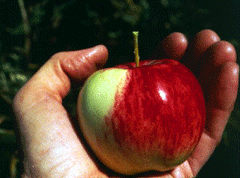
Malus Sieversii, believed to be the progenitor of the apples we eat today, still grows in the Ili Valley of Kazakhstan, but is threatened with extinction.
MAGIN: Yes, indeed. The former capital of Kazakhstan was Almaty and that means in the local language “father of apples.” So clearly apples have been very, very important to the country throughout history.
YOUNG: What is at stake if we lose the origin of the apple? I mean, we have apple trees – we’re not going to lose them. But what’s at risk here?
MAGIN: No, indeed. Well at an international level the wild trees have much wider genetic diversity than we have in the generally fairly genetically narrow domesticated varieties. And this can be very important for resistance to new pests or diseases that might emerge for these crops. And increasingly at the moment in the face of the unknown changes in the global climate that we’re facing and the challenges that those will undoubtedly bring, this huge genetic diversity could be very, very important for the security of these seeds into the future.
YOUNG: So what are the threats, what’s causing us to lose these forests?
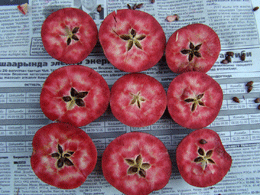
Niedzwetzky apples (malus niedzwetzkyana), famous for their red flesh. There are 111 known trees left in the world. (Photo: Kayirkul Shalpykov, Bioresource)
YOUNG: So what is the strategy for trying to protect the forests? I guess it also has to involve improving the lot of life for the people living there.
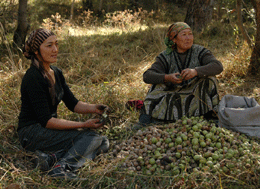
Local communities throughout Central Asia live off of the fruits of the land. (Photo: Chris Loades, FFI)
YOUNG: You know, the notion of the original apple it has just has taken hold of my mind, I can’t let go of that thought. I can’t help but thinking of some early metaphorical Eve taking a bite of this apple and here we are talking about the great knowledge in it, and its kind of, we’re talking about the fruit of the tree of knowledge, the DNA inside that fruit.
MAGIN: Indeed yes. And there is a belief that this may well have been the type of apple that Eve ate in the Garden of Eden in biblical times. And the fact that it has survived all the way through historical time and is one of the types that we’ve found in our research to be now threatened with extinction and its included in our report.
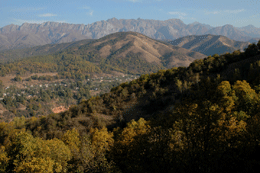
Kyrgyzstan. The high mountains of Central Asia allowed wild species of fruits and nuts to evolve separately, making the region one of the world’s biological “hotspots.” (Photo: Chris Loades, FFI)
YOUNG: And if we were to lose it – wow, talk about being tossed out of the garden.
MAGIN: [laughing] Absolutely.
YOUNG: Well, best of luck on the project. Georgina Magin is program coordinator for Flora and Fauna Internationals’ global trees campaign. Thanks very much. It’s a fascinating subject.
MAGIN: Thank you very much.
Related links:
- To learn more about Central Asia’s forests, click here.
- Fauna & Flora International
Rock the Boat
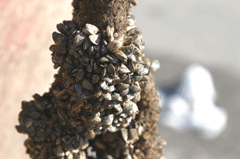
Invasive Zebra muscles aggressively attach themselves to anchors.
YOUNG: With summer coming the fish are jumping.
And wildlife experts hope fishermen will help out with a “reel” big problem—the spread of aquatic invasive species. It just a takes a few simple precautions to keep unwanted critters and diseases out.
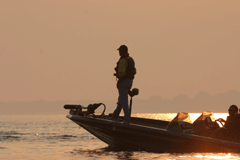
There's nothing quite like a sunset over a clean Wisconsin lake.
MUSIC: “Inspect my boat. Remove all plants, mud and critters. Drain my bilge and my life wells and motors. Toss my bate that I don’t want in the trash. And when I roll back home I rinse my boat or just let it dry naturally. And these simple steps will keep Wisconsin waters pure and clean. Everybody! Inspect my boat.”
YOUNG: [Singing] Inspect my boat. Remove all plants, mud and critters. Drain my bilge … You know I’ve gotta says that’s the first time I’ve heard the word bilge in a non-pirate song. So I really like that.
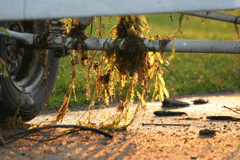
Fishermen are urged to clean their boats to keep the waters clean.
YOUNG: Tell me about this song. What’s the goal here?
SHAW: Well the basic goal here is we are primarily targeting 35 to 55 year old fishermen who are most likely to move their boats and trailers from lake to lake and body of water to body of water. So what we looked at was what different types of music do men – which by the way, I am a 41 year old fisherman myself – but what types of music do they listen to. So what I teach is social marketing type activities, so I knew from research that music can, you know, affect our memory, our attitudes, our behaviors. Why not combine all these different contexts and interests to spread the message about preventing the spread of aquatic invasive species.
YOUNG: So you have one tune here that is about stopping this spread of disease. It’s called “One Bait, One Lake.”
SHAW: Right. The story behind that song… we were doing some message testing at the Madison Fishing Expo, ‘cause we wanted to sort of pass some different advertising ideas by about how actual fishermen wanted to hear about these different messages. And so we were talking to this one fisherman and the expo and we were chatting with him about viral hemorrhagic septicemia, a long word – VHS, and we do have some of it in the state. It affects their immune systems and they actually bleed internally. So he just stood there and he said “you know what? I get it. It’s really simple. One bait, one lake.”
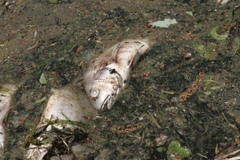
Fish infected by viral hemorrhagic septicemia.
YOUNG: Now you’ve got folk rock. You’ve got a rockabilly tune. You’ve got a pretty straight forward rock/pop kind of thing. But what about, you know, if I’m a fisherman and I like, I don’t know, gangster rap or speed metal. Have you considered ….
[LAUGHING]
YOUNG: … how are you going to reach out to me?
SHAW: Well, you know, one – we are looking at how to communicate more effectively with younger adults. And so this was just sort of an experimental project. So if we get demand for different genres of music certainly we’ll pursue those. As far as gangster rap, I don’t know that’s our demographic here in northern Wisconsin.
[LAUGHING]
SHAW: … but it’s a good idea.
YOUNG: So no D.J. Zebco spinning the reels or anything like that for now.
[LAUGHING]
YOUNG: Now this is a light hearted way to approach this and obviously we’ve been having some fun with it, but underneath all this – this is serious stuff we’re talking about. I mean the threat you guys face from these invasives and diseases – this is serious business.
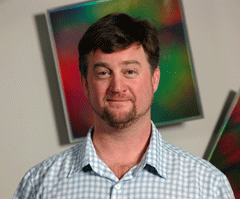
Bret Shaw

Invasive Zebra muscles aggressively attach themselves to anchors.
SHAW: Thank you.
MUSIC: “Clean boats. Clean waters for the future of our lakes. Clean boats. Clean water. A few steps is all it takes to keep our waters clean. Clean your boat every day when you take out a fishin’, when you take it out to play. Talking aquatic invasive species prevention.
[MUSIC: Brett Shaw “Ballad Of AIV”, “One Bait, One Lake”, “Clean Boat, Clean Water” (http://www.uwex.edu/erc/music/)]
CURWOOD: Just ahead – the tale of some tough girls – down Mexico way. Stay with us - on Living on Earth.
ANNOUNCER: Support for the environmental health desk at Living on Earth comes from the Cedar Tree Foundation. Support also comes from the Richard and Rhoda Goldman Fund for coverage of population and the environment. And from Gillman Ordway for coverage of conservation and environmental change.
This is Living on Earth on PRI, Public Radio International.
Related link:
Learn more about the anti-invasive campaign.
On Their Own Terms
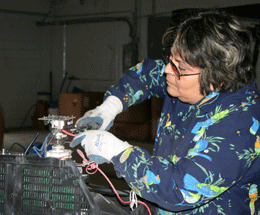
Turning a tossed TV into a job opportunity. (Photo: Ingrid Lobet)
YOUNG: It’s Living on Earth. I’m Jeff Young.
CURWOOD: And I’m Steve Curwood.
As you’ve no doubt heard, if you have an old TV and it’s not hooked up to cable or satellite, you’ll soon have no signal. American television is going digital. And you only have till June to buy a new TV – or a converter box.
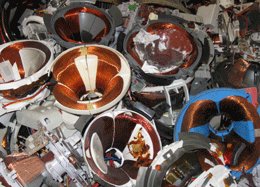
The yokes that wrap the back of old TV picture tubes are a rich source of copper.(Photo: Ingrid Lobet)
[SOUND OF TRACTOR BACKING UP]
LOBET: An eighteen-wheeler backs into the loading bay of a concrete building, 45 minutes south of the Arizona border.
[SOUND OF TRUCK STOPPING]
LOBET: The driver jumps down, hammer in hand, to break the plastic lock Mexican customs put on the truck a few miles back.
[SOUND OF LOCK BREAKING]
LOBET: The lock showed no contraband brought in from the United States.
[SOUND OF METAL HITTING CONCRETE AND MOTOR STARTING UP]
LOBET: Inside the back of the trailer, old TVs and computers are stacked floor to ceiling. Even though the electronics are at the end of their life, Mexican customs wants to know where each unit was manufactured.
[SPANISH WITH ENGLISH TRANSLATION]
HUCHIM: We brought in 37 pallets of monitors: Seventy-one monitors from China, 160 from Japan, Philippines, five from Hong Kong, and one from Finland. Net weight 11 tons.
LOBET: That's Mariano Huchim with Retroworks Mexico, a small electronics recycling startup. And from the loading dock those eleven tons of TVs and computers swiftly make their way here to this workbench…
[SOUND OF TAKING APART ELECTRONICS]
LOBET: …where, on any given day, four to eight women stand, taking them apart.
[SPANISH WITH ENGLISH TRANSLATION]
COTA: We are super happy with this work.
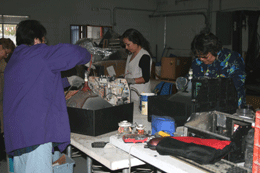
Maria Dolores Cota, Lidia Barreda, Mirta Rico Armenta, Vicki Ponce, some of the Retroworks chicas bravas at work. The electricity in the building still hasn't been turned on due to resistance from the local mayor. (Photo: Ingrid Lobet)
LOBET: Maria Dolores Cota, or Dona Loli, as her coworkers call her, says she's very grateful to have this job, because she went a long time without one.
COTA: We got the opportunity to work! And we are older--we didn’t have the slightest hope. In Mexico there was NO hope for us to work.
LOBET: Lidia Barreda, takes apart a TV next to her, and chimes in.
BARREDA: It's really true because here in Mexico there's a lot of discrimination against people who are older. After the age of 35, it's hard to get a job. It's not like in the United States where older people keep on working.
LOBET: There have been few jobs here in the town of Fronteras ever since a Levelor blinds factory closed. So about three years ago a group of women, in their 50s, decided to organize. They invited a local rancher who speaks English, Alice Valenzuela, to join them and asked for her help. Soon after, Alice ran into a business owner from Vermont. He runs an electronics recycling company and was looking to expand. She tried to persuade him to do it in Fronteras. Some in town were skeptical.
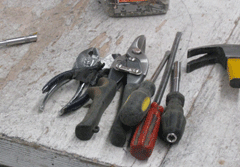
The tools of the chicas' trade: pliers, wire cutters, tin snips, screwdriver and ratchet screwdriver. The women say they could work three times as fast if they had the electricity to power pneumatic tools. (Photo: Ingrid Lobet)
VALENZUELA: Everybody said the women's cooperative would never make it. We we had no money and no contacts so we would never find a building in which to put a business. We would never find an investor who would want to come to a town with dirt streets and no infrastructure.
LOBET: But the Vermont recycler, American Retroworks Inc., did partner with them. And local officials lent them the old Levelor blinds building. Next thing they knew, these older, unemployed women from a small town in northern Mexico were on their way to Vermont to learn the e-waste trade.
VALENZUELA: That meant getting on a plane for the first time in their lives. That meant changing planes at JFK airport when they don’t speak English and had never had that experience before.
LOBET: That trip to Vermont left a lasting impression says Doña Loli.
COTA: The people there, they didn't view us as outsiders. They treated us like equals. There was no age discrimination. There was no racism. It was very different from Mexico.
LOBET: Since then, the economy has taken a dive. But the owner of Retroworks in Vermont has told the women he'll stick with them, and that wins him their undying allegiance.
DOÑA LOLI: He says he really cares about us. He says we're his family. I mean, who are we, really? But for him, we are somebody.
LOBET: Fully trained, the group began organizing roundups of old electronics across southern Arizona, then trucked the goods here to take apart. People in town started calling them las chicas bravas, the tough girls.
[SOUND OF RUSTLING IN BARRELS]
PONCE: This is pure copper….These are mother boards from computer monitors…. These are fans from television sets.. These contain gold.
[SOUNDS OF GOLD CHIPS TINKLING]
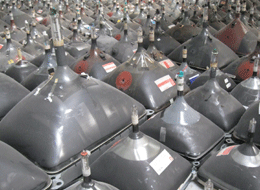
TV picture tubes awaiting proper disposal. (Photo: Ingrid Lobet)
LOBET: Vicki Ponce shows how they sort the motherboards and fans and copper wire into barrels. They sell the parts to buyers in Florida, Malaysia and Egypt.
[SOUNDS OF HAND TOOLS]
LOBET: Yet, a year and a half after they began taking apart electronics here, the women continue to work in this building without electricity. The mayor has asked the electric company to keep the power off. He seems to have something against them.
PONCE: Probably it's because we haven't made any contributions to him. Or it could be that he hates us because we stood up for ourselves.
LOBET: Getting this business off the ground has been one constant struggle. Throughout the office visits to get numerous licenses and permits, the women have refused to pay any bribes. Many people here agree that refusal has slowed their progress. But they won't budge.
PONCE: We want everything clean. …We want to hold our heads up, we don't want people to say we were involved in anything shady. So that investors who come to Sonora know that we're operating honestly.
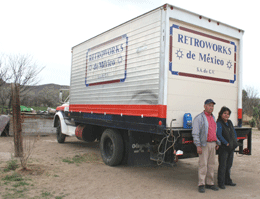
Vicki Ponce and Don Antonio "Chuco" Chavez Othon with the Retroworks truck in their backyard and the Sonoran mountains behind. (Photo: Magdalena Gonzalez)
LOBET: The women say the adversity has made them stronger. Vicki Ponce remembers her fourth visit to one government office.
PONCE: We had been there for two or three hours. They kept saying, he hasn't arrived, and he hasn't arrived.
LOBET: Finally someone came out and said "come back tomorrow"
PONCE: And we said we're not coming back, because we're not leaving here until you give us that paper. Look at my hands, do you see long painted fingernails? These are the hands of a working woman, and we need that paper in order to keep working. You are the government and you have to deal with us because you live off our salary.
LOBET: Vicki and the other women say some of that internal fortitude they've developed, comes from working closely with Alice Valenzuela, the rancher who's struggled with them every step of the way.
PONCE: Alice, She has another culture. You know Mexican women, we are often raised to put up with hard times and just adapt to our husbands. But she speaks her mind. And she tells us we have worth, no matter who we're talking to. We have rights as citizens. And our politicians should serve us, not serve themselves.
LOBET: The women joke that their bond with Alice is so strong, their fates are cast together.
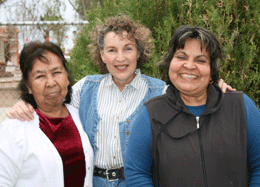
Doña Alicia Menta Gomez, Alice Valenzuela and Vicki Ponce. (Photo: Magdalena Gonzalez)
PONCE: We're like a married couple. We can't be broken up. We have fights, but we stay together, we can't get divorced. Sometimes we say 'what a mean husband we got!' [laughs]
[SOUND OF WAREHOUSE DOORS ROLLING UP.]
LOBET: The perseverance through all the paperwork and the resistance from the mayor, is paying off. The little startup is expanding. Recently they had to rent a bigger warehouse in Douglas, Arizona.
HUCHIM: This company could go very far, very, very far.
LOBET: Mariano Huchim runs Retroworks' warehouse and has a computer science degree. When computers and TVs arrive here from curbside pickups, nothing makes him happier than to cherry pick the good ones and put them back into use.
HUCHIM: Just because the people in the United States don't want something, doesn’t mean we're going to destroy it. No. We check to see if it's still good for someone else to use. Then we update it and test it to make sure it works perfectly.
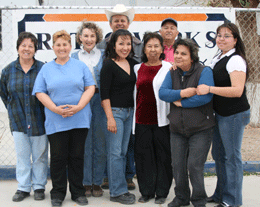
The Retroworks team in Mexico; two more employees work on the U.S. side of the border. (Photo: Magdalena Gonzalez)
LOBET: Mariano says Mexican customers are crossing the border into Arizona to buy these refurbished computers.
HUCHIM: People are really buying them. We've sold maybe 200 computers and nobody's brought us one back yet.
[SOUND OF WAREHOUSE DOORS CLOSING]
LOBET: Although Retroworks Mexico is growing, there is one thing that's keeping it from the big time -- from contracts with companies that have thousands of old computers
[SOUND OF DRIVING]
LOBET: And that's what has Alice and Vicki on the road today.
VALENZUELA: They would love to help us create jobs and they would love to give us their electronics
LOBET: But the glass in computer monitors contains lead. And lead tainted glass cannot be disposed of in a regular landfill. It has to go to a special EPA-approved landfill or a metals plant. Companies don't want to be seen as trying to get around that.

Vicki Ponce at work. (Photo: Ingrid Lobet)
VALENZUELA: They don't want to be accused of sending their waste to a developing country and Mexico does not want to be perceived as the trash dump for the United States.
LOBET: But it turns out there is a giant, EPA-approved copper smelter just 20 miles down the road from Retroworks Mexico. So today, in a meeting they've been trying to arrange for months, Vicki and Alice are hoping to persuade the smelter to take the glass that's been building up in their warehouse, along with a lot more in the future.
VALENZUELA: It would be transformational because we anticipate being able to get not only large contracts from corporations for their electronics, we anticipate that other recyclers will pay us to take their glass because they know where it is going to end up.
LOBET: The meeting with the copper company goes well. Better than expected. Maybe this will be their breakthrough.
Vicki Ponce says a breakthrough will come, sooner or later. She believes in recycling, believes that industry will increasingly mine the industrial ore for its raw materials. And she says she doesn't regret for one minute getting together with this group of women 3 years ago to see if they could create employment in their town.
PONCE: The economy is for entrepreneurial people, people willing to take risks, people who want to move forward. Otherwise we 'd be sitting around with out arms crossed, earning nothing.
LOBET: For Living On Earth, I'm Ingrid Lobet in Fronteras, Mexico.
[MUSIC: Fronteras Recycling: Estampas De Me xico “La Jarabe Jalisciense” from Traditional Music Of Mexico (ARCMusic 2008)]
Related link:
For more on Retroworks, click here.
Potty Humor
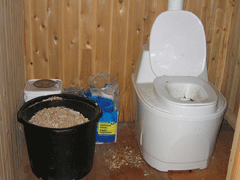
A green bathroom reader helps you do more than just generate compost while on the toilet.
YOUNG: June is coming--the month for brides and the summer solstice and National Bathroom Reading Week. Which might well be Gordon Javna’s favorite week of the year. Javna’s better known as Uncle John, editor of the series of Uncle John’s Bathroom Readers. They’re chockful of trivia like, for example, the fact that we have a week dedicated to bathroom reading—who knew?
His latest is Uncle John’s Certified Organic Bathroom Reader, in which Javna plumbs the depths of environmental issues. Javna says he heard all sorts of conflicting claims about our environment and he wanted to, well, get to the bottom of things.

Gordon Javna is better known as Uncle John to his fans.(Courtesy of Gordon Javna)
YOUNG: This seems especially rich in puns. For example, you’ve got a chapter here on converting human waste into energy. And its called…
JAVNA: Its called “The Power of Poo”
YOUNG: Uh-huh.
[LAUGHING]
YOUNG: Did you find that this content matter that you’re dealing with here, the environmental issues, have more opportunity for potty humor than say other subjects that you’ve written about?
JAVNA: Short answer to your question is yes. And even on the front page it says and entertaining look at the green movement and as I said, we love anything that says movement. I can’t use the word pooh in most article so.
YOUNG: Now you also have a section here on Human Litter Box which is about composting toilets.
JAVNA: Yeah. Every American flushes about twenty gallons of water a day, fresh water. That adds up to hundreds of dollars worth of water a year. And one alternative is a composting toilet. Interestingly, the composting toilets was invented in the 1860s when there was a cholera epidemic in England and a priest named Henry Mule invented what he called – not a water closet – but a dry earth closet, which was basically a wooden box with a bucket [laughing] underneath and you pull a lever and it dispensed a layer of fine dirt or ashes. And composting toilets haven’t changed much since then.
YOUNG: Well, you know when you get into covering serious environmental stuff, you run into this problem of – it gets pretty darn gloomy. But I think you’ve done a nice job of countering that with some kind of good examples of people who are trying to find solutions. And I found a great example of that on your section on new forms of renewable energy, this thing called the wind belt… Can you tell me about that one?
JAVNA: Yes. The wind belt is an alternative to turbines. It was invented by a Californian named Shawn Frayne, a young man who was visiting Haiti in 2004 when he realized that a lot of people didn’t have access to power, they were using kerosene lamps to light their homes. And so what he did was he took a piece of taffeta coated in mylar and he strung it between two trees. And when a wind blows this little strap, the strap goes back and forth and it moves between the copper coils and it creates an electric current that is strong enough to power a light or a radio.
YOUNG: Well you know one of my favorite bits – at the bottom of each page, you have some little trivia tidbit, for example Chevron has an oil tanker named the Condoleezza Rice. And my personal favorite here on page 149 – on a 1982 special episode of “Different Strokes” acid rain turns Kimberly’s hair green. I just love that for some reason.
[LAUGHING]
JAVNA: How about the fact that at Harvard, Al Gore got a D in natural sciences.
[LAUGHING]
YOUNG: You can’t make up stuff like this. But, where do you find all of this stuff?
JAVNA: The Bathroom Readers Institute is a team of writers and researchers, and we’re constantly collecting information, fun facts, interesting facts, things that make you go “hmm,” such as 1908 Ford Model T got better gas mileage than the 2008 Ford Explorer.
YOUNG: How about that. But did you know that Britain’s government buildings emit more greenhouse gases than the entire nation of Kenya?
JAVNA: Yes I did know that.
[LAUGHING]
JAVNA: And did you know that there are more than 9000 man made objects floating in space?
YOUNG: I did.
[LAUGHING]
YOUNG: Thanks to your book. So are you like a champion at trivia nights at the pub or what?
JAVNA: Nobody let’s me play. So sad.
[LAUGHING]
JAVNA: That’s just as well because if I lose, I’d be in deep … you know.
YOUNG: Oh, don’t say it!
[LAUGHING]
YOUNG: Now another thing your research turned up here – help me out, on page 58. Do you mind reading this short letter. This was a letter to the editor apparently to the “Arkansas Democrat” from 2007. And it has to do with moving the start time for daylight savings.
JAVNA: Yes. And this goes back to – you can’t make this stuff up. Here we go: As you know daylight savings time started a month earlier this year. You’d think that members of Congress would have considered the warming effect that an extra hour of daylight would have on our climate – or did they?
[LAUGHING]
YOUNG: The power of Congress to make the sun shine an extra hour.
Gordon Javna is better known as Uncle John, editor of “Uncle John’s Bathroom Reader” books and he is flush with success from publication of his new book “Certified Organic Bathroom Reader: An entertaining look at the green movement.” Thanks very much for your time.
JAVNA: Thanks Jeff. It’s great to be with you.
[MUSIC: Various Artists “Uncle John’s Band” from Pickin On The Grateful Dead Vol. 2 (CMH Records 2000)]
Related link:
Bathroom Reader Homepage
YOUNG: On the next Living on Earth: Learning to turn hazardous materials into a career.
KAPLAN: It’s a job. It’s a dirty job but it’s a job. It has a paycheck attached to it. It also has security attached to it. These jobs cannot be sent off to China.
Boot camp for green job hopefuls. Next time on Living on Earth.
CURWOOD: Living on Earth is produced by the World Media Foundation. Our crew includes Bobby Bascomb, Eileen Bolinsky, Bruce Gellerman, Ingrid Lobet, Helen Palmer, Ike Sriskandarajah, and Mitra Taj, with help from Sarah Calkins and Marilyn Govoni.
YOUNG: Our interns are Lindsay Breslau, Liz Gross, Phil DiMartino and Christine Parrish. Special thanks today to Fabiola Alcerreca, Rosie Amador and Rosario Hubert. Jeff Turton is our technical director. Alison Lirish Dean composed our themes. You can find us anytime at LOE.org.
I’m Jeff Young.
CURWOOD: And I’m Steve Curwood Thanks for listening.
ANNOUNCER: Funding for Living on Earth comes from the National Science Foundation, supporting coverage of emerging science. And Stonyfield Farm, organic yogurt and smoothies. Stonyfield pays its farmers not to use artificial growth hormones on their cows. Details at Stonyfield dot com. Support also comes from you, our listeners. The Ford Foundation, The Town Creek Foundation, and the Oak Foundation. Supporting coverage of climate change and marine issues. The Rockefeller Foundation and its campaign for American workers. More at rockfound dot org. And Pax World mutual funds, socially and environmentally sustainable investing. Pax World for tomorrow on the web at Pax World dot com.
ANNOUNCER 2: PRI Public Radio International
Living on Earth wants to hear from you!
Living on Earth
62 Calef Highway, Suite 212
Lee, NH 03861
Telephone: 617-287-4121
E-mail: comments@loe.org
Newsletter [Click here]
Donate to Living on Earth!
Living on Earth is an independent media program and relies entirely on contributions from listeners and institutions supporting public service. Please donate now to preserve an independent environmental voice.
NewsletterLiving on Earth offers a weekly delivery of the show's rundown to your mailbox. Sign up for our newsletter today!
 Sailors For The Sea: Be the change you want to sea.
Sailors For The Sea: Be the change you want to sea.
 The Grantham Foundation for the Protection of the Environment: Committed to protecting and improving the health of the global environment.
The Grantham Foundation for the Protection of the Environment: Committed to protecting and improving the health of the global environment.
 Contribute to Living on Earth and receive, as our gift to you, an archival print of one of Mark Seth Lender's extraordinary wildlife photographs. Follow the link to see Mark's current collection of photographs.
Contribute to Living on Earth and receive, as our gift to you, an archival print of one of Mark Seth Lender's extraordinary wildlife photographs. Follow the link to see Mark's current collection of photographs.
 Buy a signed copy of Mark Seth Lender's book Smeagull the Seagull & support Living on Earth
Buy a signed copy of Mark Seth Lender's book Smeagull the Seagull & support Living on Earth

